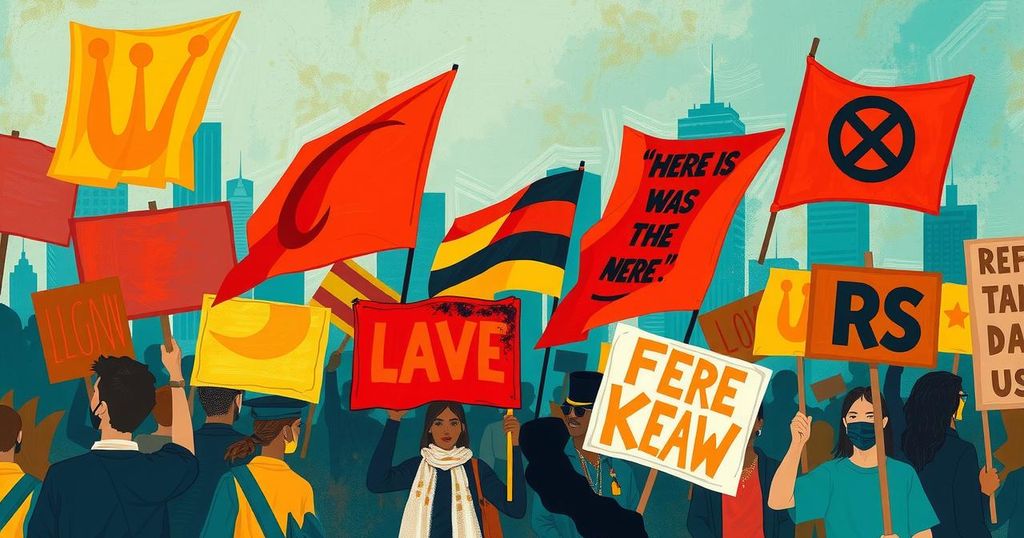Global news
ASIA, EUROPE/ASIA, HEZBOLLAH, INTERNATIONAL RELATIONS, IRAN, KHOMEINI, MARITIME SECURITY, MIDDLE EAST, MINISTRY OF INTELLIGENCE, MOHAMMAD REZA PAHLAVI, NATEGH NOURI, NATIONAL ASSEMBLY, NCRI, NORTH AMERICA, PANAMA, PANAMA MARITIME AUTHORITY, QOM, RAMÓN FRANCO, RAMON FRANCO, RUSSIA, SANCTIONS, TEHRAN, UNITED STATES, US-IRAN RELATIONS, WASHINGTON
Leila Ramsay
0 Comments
Current Developments in Iran: Repression, Resistance, and International Reactions
The article reports on escalating repression in Iran, as regime officials acknowledge the threat to their power. There’s a crackdown on sanctioned vessels by Panama, while the U.S. targets a sanctions evasion network linked to Hizballah. The PMOI Resistance Units show significant growth in anti-regime activities. Reports highlight a systemic corruption issue within Iran’s economy and a troubling denial of medical care to political prisoners. An exhibition in Luxembourg calls attention to human rights violations in Iran.
In recent developments surrounding Iran, regime officials have acknowledged the increasing threats to their power. Over the past seven years, figures such as Nategh Nouri and Javad Amoli have expressed concerns regarding the possibility of regime collapse, particularly in light of ongoing economic crises and foreign policy failures. The supreme leader’s strategy has consequently shifted towards heightened repression of dissent.
Historically, repression has been a hallmark of Iranian governance, dating back to the reign of Mohammad Reza Pahlavi and the operational activities of SAVAK, which later transformed into the Ministry of Intelligence. A recent documentary highlighted that ten divisions of SAVAK pledged their loyalty to Khomeini prior to the Shah’s departure, underlining the continuity of oppressive measures.
On a broader international front, Panama has intensified efforts against sanctioned vessels by revoking the registration of 128 ships linked to a shadow fleet facilitating oil exports from both Russia and Iran. Ramón Franco from the Panama Maritime Authority confirmed that 70 tankers have already been deregistered, reflecting Panama’s commitment to reinforcing global sanctions and regulating illicit energy trade.
In a related effort, the U.S. Treasury Department has announced sanctions against five individuals and three companies associated with a sanctions evasion network that provides support to the Hizballah finance team. This network, in collaboration with Iran’s IRGC-QF, has reportedly been instrumental in generating significant revenue through oil smuggling and other commercial ventures.
Furthermore, the PMOI Resistance Units have recently asserted their influence in opposing the Iranian regime, with an impressive record of over 39,000 anti-regime activities documented across multiple provinces in the past year. This significant growth raises questions about the regime’s stability as public dissent continues to manifest despite severe repression.
In its recent UN report concerning the 2022 protests, the Iranian regime’s special committee attempted to deflect responsibility for the violent suppressions by wrongly attributing the unrest to U.S. sanctions rather than acknowledging the deep-rooted political and social grievances fueling the protests.
Amidst charges of systemic corruption, Majidreza Hariri of the Iran-China Chamber of Commerce disclosed that an alarming $25 billion escapes Iran’s economy annually due to rampant corruption. He likened the economy to a sinking ship necessitating immediate corrective actions to avert disastrous consequences.
Moreover, the plight of Varisha Moradi, a political prisoner sentenced to death, has drawn attention as she is denied essential medical care despite serious health issues. This situation reflects a troubling pattern of neglect toward political prisoners, exacerbating human rights concerns in the country.
Reports indicate that approximately 17 million barrels of Iranian crude oil are stranded near Malaysia due to international sanctions. Ten tankers laden with Iranian oil have reportedly been anchored without buyers, signaling potential challenges in Iran’s oil export efforts.
Iran’s leadership, particularly Supreme Leader Ali Khamenei, has remained resolute in rejecting negotiations with the U.S., perceiving such talks as potential avenues for manipulation. The regime’s covert intentions regarding its nuclear program, initially exposed by the NCRI, pose a fundamental challenge for not only regional stability but also for the Iranian populace.
In a demonstration of solidarity, supporters of the PMOI/MEK held an exhibition in Luxembourg to raise awareness concerning the human rights violations within Iran. The event was dedicated to political prisoners facing death sentences and coincided with the broader resistance against the regime’s oppressive actions, echoing themes of freedom and justice within the Iranian community.
In summary, the current situation in Iran highlights the regime’s increasing reliance on repression to maintain control amidst growing dissent and economic instability. Efforts by international authorities to enforce sanctions against Iran and its affiliates are gaining momentum. Simultaneously, public resistance, exemplified by the PMOI Resistance Units and the Iranian diaspora’s actions abroad, underscores a significant push for freedom and human rights amid systemic corruption and repression within the Iranian judicial and political frameworks.
Original Source: www.ncr-iran.org




Post Comment